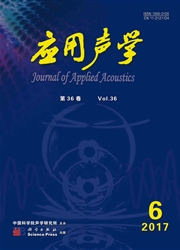

 中文摘要:
中文摘要:
椰胡是具有地方特色的拉弦乐器之一,多用于演奏广东音乐和广东戏曲、曲艺的伴奏。但对其发声强度一直未进行过科学的测试。本文介绍在华南理工大学半消声室内参照ISO(GB)标准对椰胡声功率级的测量工作。由两位资深乐师分别用两把椰胡在PP,mp,厂和矿力度下演奏单音、音阶和乐曲,对每一把椰胡的每一测试内容,由十通道测试设备同步测试中心频率为100~10000Hz的1/3倍频带声压级谱,通过计算获得每把椰胡在演奏每项内容时的声功率级和动态范围。通过对两把椰胡的测试结果进行平均,获得该乐器在演奏上述内容时的典型声功率级数值及频谱。文中并将半消声室内的测试结果与混响室内的测试结果相对比,探讨测试环境对测试结果的影响。民族乐器发声强度及其频谱特性的获得是开展民族音乐厅堂音质研究的基础。
 英文摘要:
英文摘要:
Yehu, as an important Chinese music instrument, is popularly used in Guangdong local music and Guangdong opera. Its sound power level has never been carefully measured. The first systematic measurement for determining the sound power level of Yehu instrument in a semi-anechoic chamber is reported here. Two professional musicians performed respectively on their own instruments. A ten-channel acoustical equipment was used to measure the sound pressure level spectrum synchronously when some single notes, music scale and melodies are performed under lap, rap, f and ffdynamics respectively. The radiated sound power levels and dynamic ranges of each instrument were then calculated. The measured sound power level results of each Yehu instrument were averaged to get the typical sound power levels and spectrum of the Yehu instrument when melodies, music scale and single notes are performed under pp, rap, f and ff dynamics respectively. The measured results in the semi anechoic chamber were then compared with those obtained in a reverberation chamber in order to investigate the effect of room acoustical condition on sound power radiation. Sound intensity measurements of national musical instruments lay the foundations for investigating the room acoustical condition of national music halls.
 同期刊论文项目
同期刊论文项目
 同项目期刊论文
同项目期刊论文
 Report on Research Projects on Head-Related Transfer Functions and Virtual Auditory Displays in Chin
Report on Research Projects on Head-Related Transfer Functions and Virtual Auditory Displays in Chin Analysis on minimum-phase characteristics of measured head-related transfer functions affected by so
Analysis on minimum-phase characteristics of measured head-related transfer functions affected by so 期刊信息
期刊信息
